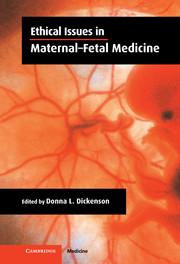Book contents
- Frontmatter
- Contents
- List of contributors
- Acknowledgements
- 1 Introduction: recent debates in maternal–fetal medicine – what are the ethical questions?
- 2 Overview: a framework for reproductive ethics
- I GENERIC ISSUES IN PREGNANCY
- II INCEPTION OF PREGNANCY: NEW REPRODUCTIVE TECHNOLOGIES
- III FIRST AND SECOND TRIMESTER
- IV THIRD TRIMESTER
- V NEONATAL LIFE
- 19 Do new reproductive technologies benefit or harm children?
- 20 Are there lives not worth living? When is it morally wrong to reproduce?
- 21 Ethical issues in withdrawing life-sustaining treatment from handicapped neonates
- Index
20 - Are there lives not worth living? When is it morally wrong to reproduce?
from V - NEONATAL LIFE
Published online by Cambridge University Press: 29 September 2009
- Frontmatter
- Contents
- List of contributors
- Acknowledgements
- 1 Introduction: recent debates in maternal–fetal medicine – what are the ethical questions?
- 2 Overview: a framework for reproductive ethics
- I GENERIC ISSUES IN PREGNANCY
- II INCEPTION OF PREGNANCY: NEW REPRODUCTIVE TECHNOLOGIES
- III FIRST AND SECOND TRIMESTER
- IV THIRD TRIMESTER
- V NEONATAL LIFE
- 19 Do new reproductive technologies benefit or harm children?
- 20 Are there lives not worth living? When is it morally wrong to reproduce?
- 21 Ethical issues in withdrawing life-sustaining treatment from handicapped neonates
- Index
Summary
The idea that it might be a moral crime to have a baby, that it might be wrong to bring a new human individual into the world is to many people simply bizarre. Having a baby is a wonderful thing to do, it is usually regarded as the unproblematic choice from the moral if not from the ‘social’ or medical point of view. It is only having an abortion and perhaps also refraining from having children that is regarded as requiring justification . . . [T]he idea that one might be harmed or wronged by being brought into existence in less than a satisfactory state is very important indeed, for, as we have seen, it challenges many of our moral presumptions about having children. Moreover, if the alleged wrong can give rise to legal actions for compensation, and perhaps also to criminal liability then a number of further problems arise.
(Harris, 1998: pp. 99 and 101.)In this chapter we attempt to investigate the possible wrongs and harms for which people might be responsible in having or attempting to have children. We start ‘together’, so to speak, but as the argument develops points of difference arise. In charting both the points of agreement and those of difference we hope to throw light on and diffuse heat from a debate that is so often characterized by little of the former and a swelter of the latter.
- Type
- Chapter
- Information
- Ethical Issues in Maternal-Fetal Medicine , pp. 321 - 334Publisher: Cambridge University PressPrint publication year: 2002
- 9
- Cited by

